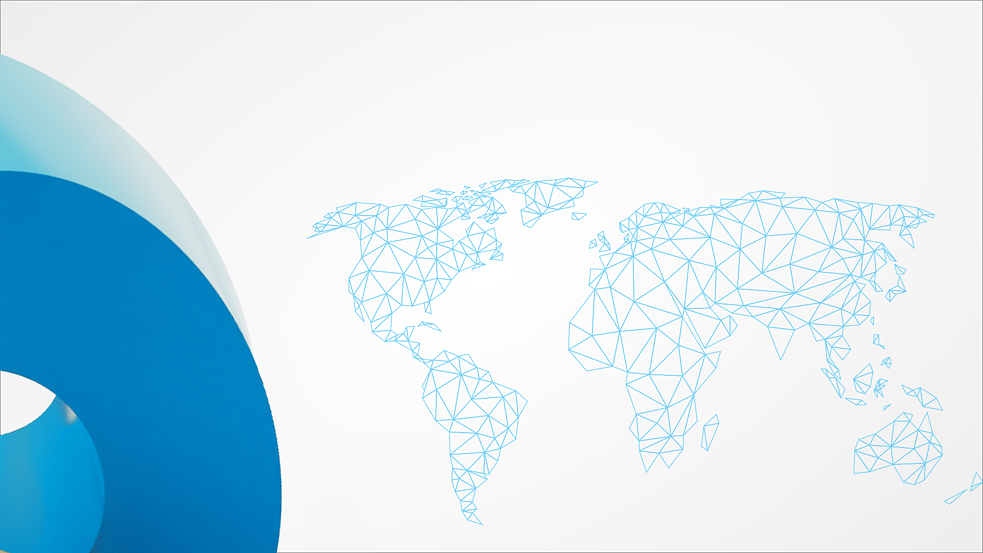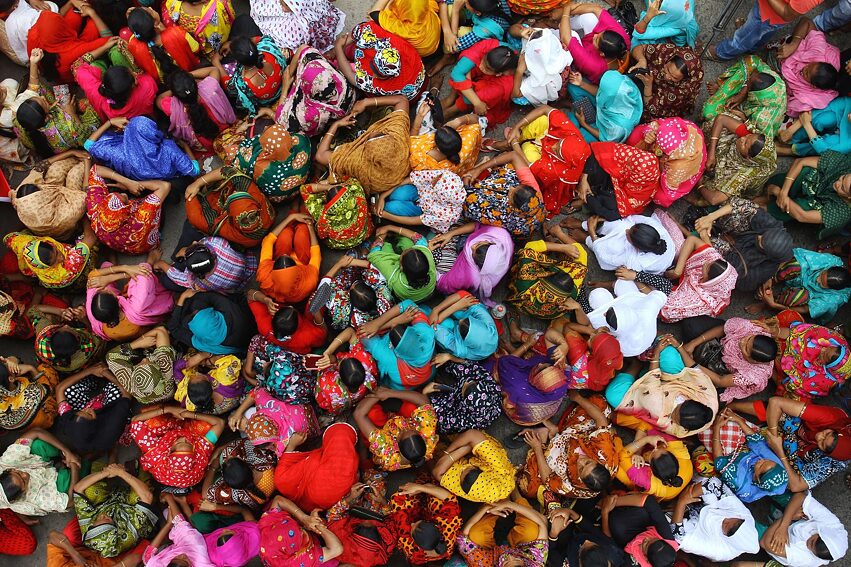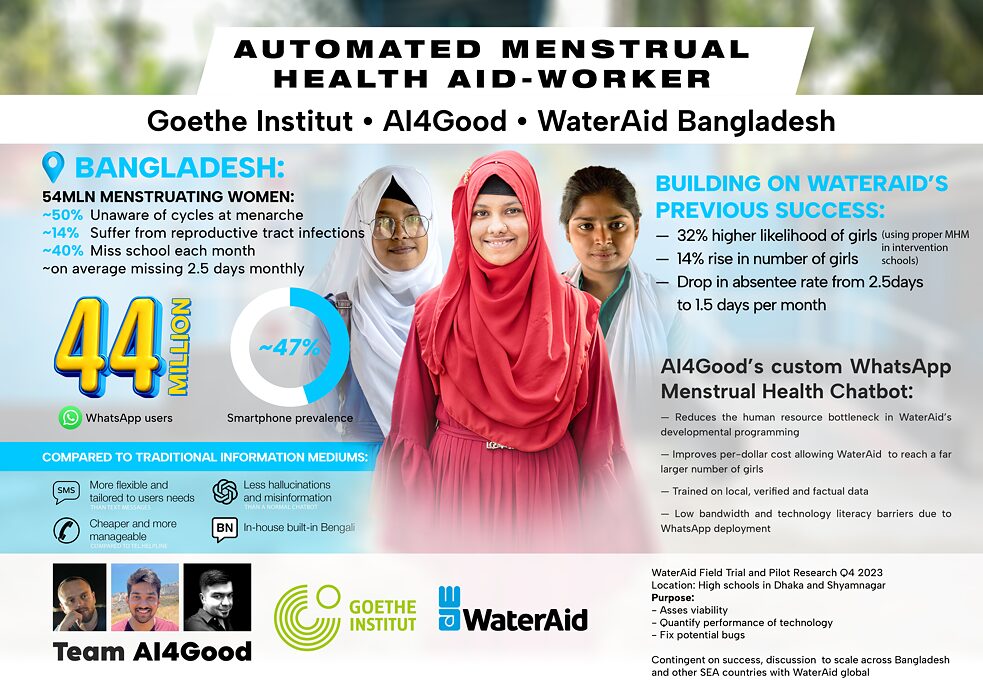AI4Good

Advances in generative AI technologies like large language models have created unique opportunities to develop open tools that improve access to public health information. Historically, the benefits of technological advances have been slower to reach the global south compared to the harms. Bearing this in mind, we reached out to a leading nonprofit asking how we could develop assistive technology to amplify the benefits they provide to local populations. Our large language model (LLM) based system can converse with local populations allowing them to access accurate, verified, and multilingual healthcare information, specifically relating to menstrual health and hygiene.
We are able to scale the services provided by the non-profit, improving awareness and access to information based on personalized healthcare requirements among women in Bangladesh. We showcase this novel application of AI in a robust and safe manner to address the needs of diverse populations in the global south. We aim to demonstrate viable ways to deploy LLMs over restricted document databases that can introduce a means to publicly govern the information that it is able to converse over. This opens the doors to operationalizing passive mechanisms like fact-checks in order to actively counter the spread of false and misleading information on the internet, and safely informing and educating the target audience.
During Goethe-Institut’s AI2Amplify Fellowship, our team members actively networked and bonded, striving to supplement each other's talents. Thanks to our backgrounds we already had the most important pieces of the puzzle. Thanks to our technical lead, Swapneel Mehta, we managed to set up access to LLM endpoints that could be operated over custom fact-checked data to ultimately mitigate hallucinations. This LLM application could be deployed across a myriad of social media and languages. And thanks to Sadhli Roomy, we found a perfect partnership opportunity. His connections to WaterAid Bangladesh, an NGO focusing on public health and water resources, enabled us to address a relevant cause and identify a high-impact use case for the technology. This provided the perfect recipe for fulfilling our namesake, using AI for the good of the community. We have the fortune to be advised by Bengali-origin professionals in healthcare with life experience in Bangladesh and the United States.
More than 54 million women in Bangladesh menstruate. Yet, they face period stigma, as often girls do not even know what menstruation is before they first experience it. This culture of silence creates barriers, stiffing their health, education and societal outcomes. Improper sanitation often leads to reproductive tract infections, of which 13% of Bangladeshi girls and women suffered in 2014.
Furthermore, girls and women miss out on education due to their cycles, with absentee girls missing an average of 2.5 days each cycle, and about 40% of girls and women missing school during their periods. While AI is seldom the whole solution, it can certainly help solve the problem of women and girls in Bangladesh being inadequately prepared to face menstruation.
NGOs such as WaterAid Bangladesh help educate and inform local girls and women on Menstruation Health Management (MHM) to enable best practices in regards to menstrual hygiene and health. They have also provided thousands of women with Water, Hygiene and Sanitation (WASH) products and facilities. Furthermore, studies they conducted have provided evidence that their Menstrual Hygiene Management drives can lower school absences and improve the quality of life of local women and girls. As such, NGOs like WaterAid constitute the bedrock of the solution, which we will supplement. Making use of the economies of scale of LLMs, we can assist in educating and informing local girls and women on proper MHM practices, leading to improved health, education, and societal outcomes.
There are other more traditional systems in place, such as door-to-door aid workers outreaching on such topics, telephone helplines, and even text message services, but our approach has stark advantages over them. Door-to-door aid work is not scalable. Aid-work is expensive, and it requires human and financial capital, which for a population of 54 million girls and women is not an ideal or viable solution on its own. Telephone helplines face a similar issue, being largely unscalable, and their service often comes with long wait times and large expenses. Messaging services on the other hand are less flexible and useful in a dynamic information and education setting.
In coordination with WaterAid we are working to deploy a field trial of our Telegram and WhatsApp chatbot to aid-workers, girls and women in the local community of Shyamnagar sub-district of Bangladesh. A deeply climate vulnerable region that has prevalent gaps in menstrual hygiene knowledge in adolescent girl groups. The service will be deployed through an educational facility in the local community, which will allow us to inclusively work with WaterAid as well as the affected girls and women. This will give us the chance to listen to their feedback, in order to improve the application so that it better supports them.
Our LLM model can be deployed on Telegram, Whatsapp and other text based social media, ensuring its viability in low resource and limited-bandwidth environments. Bangladesh enjoys a high smartphone penetration rate, while our targeted trial will run in the Shyamnagar sub-district where an estimated 21,900 women within the age group of 18 to 30 years own smartphones. This number is thrice greater in the male counterparts of the same age range. We will also test out an intermediary-based service delivery model, using aid workers and youth networks prevalent in deep rural Bangladesh. This prototype model could minimize the need for smart device ownership and technological dependencies with the help of WaterAid Bangladesh.
This trial is our chance to work and cooperate directly with this vulnerable community and their counterparts in the field of MHM aid-work. This would allow us to better understand their struggle and concerns, and through their feedback, improve our application so it better serves them. We hope this initial field trial of our application could help hundreds or even thousands of girls and women in the local community stay well informed on Menstruation Hygiene Management, and improve their health, education, and societal outcomes. Ultimately, we strive to be a small piece of the larger puzzle, whose final image reveals happier, healthier, and more dignified lives for women and girls.
As of April 2024, the LLM-powered chatbot solution has been adopted by Acme AI Ltd. - a boutique AI solution developer and data processing outfit in Bangladesh - and is named Probahini. Acme AI is working with WaterAid Bangladesh to scale the Probahini chatbot and has secured a userbase of 6,000 adolescent girls in just 30 days. Through Acme AI, the chatbot is also being stewarded by the MHM Platform - a network of 50+ development and private sector organisations which work to drive gender equality in Bangladesh.
Team members:
Armir Celiku (Kicevo, North Macedonia)
Swapneel Mehta (New York City, USA)
Sadhli Roomy (Dhaka, Bangladesh)
AI4Good is one of the two final winning teams of the project.


